Pascal Nazareth
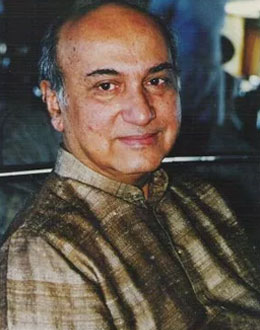
Holding a Masters Degree in Economics from Madras University, Pascal Alan Nazareth was selected for the Indian Foreign Service in May 1959. He has served in India’s diplomatic and consular missions in Tokyo, Rangoon, Lima, London, Chicago and New York and as India’s High Commissioner to Ghana and Ambassador to Egypt and Mexico.
Mr. Nazareth has been a guest lecturer at the National Institute of Advanced Studies & Indian Institute of Management, Bangalore and National Defense College New Delhi. He has lectured abroad in Stanford, Yale, Columbia & New York Universities, spoken at the San Francisco ‘World Affairs Council’, in Moscow State University for the Humanities and St. Petersburg State University in Russia.
Mr. Nazareth’s ‘Gandhi’s Outstanding Leadership’ book was published in March 2006 and since then has come out in 12 Indian languages and also in Arabic, Dutch, French, German, Hungarian, Indonesian Italian, Korean, Mandarin, Nepali, Polish, Portuguese, Romanian, Russian, Serbian, Spanish, Swedish & Turkish. Eight of these European editions carry a Foreword written by former Soviet President Mikhail Gorbachev.
Radha Bhatt
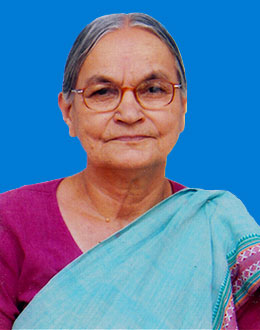
RadhaJi has been involved in Gandhian Social Work since 1951. Some of her beneficial programs in India were Nai Taleem – a balwari pre-school education for village children, women’s empowerment through training of Khadi workers, etc.
She has organized & actively participated in people’s movements such as the Chipko (Hug the trees) movement, the Anti-Liquor movement, protested against Indiscriminate Mining, Save the Rivers of Uttarakhand and spearheaded the campaign for Community Peace in Assam, etc.
She has participated in seminars and conferences for delivering the message of Non-violence (Ahimsa), Peace and Environmental Protection in diverse countries, including the Scandinavian countries, Germany, France, Canada, the United States, Mexico, Nepal, South Korea, China, Thailand, etc.
She has held responsibilities in various National Gandhian Institutions such as Gandhi Peace Foundation, Kasturba Gandhi National Memorial Trust, Sarva Seva Sangh and the Himalaya Seva Sangh.
Ram Mashelkar
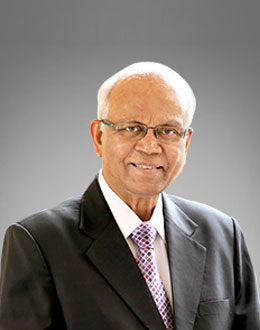
Dr. R.A. Mashelkar is National Research Professor and President of Global Research Alliance, a network of leading Research and Technology organizations. He was the Director General of Council of Scientific and Industrial Research (CSIR) and President of Indian National Science Academy.
Dr. Mashelkar spearheaded the successful challenge to the US patent on the use of turmeric for wound healing and also the patent on Basmati rice. As Chairman of India’s National Innovation Foundation, he has championed the cause of grass roots innovators.
His original concept of Gandhian Engineering to get `more from less for more people’ has influenced global thinking. In the post-liberalized India, Dr. Mashelkar has played a critical role in shaping India’s S & T Policies in his capacity as a member of the Scientific Advisory Council to the Prime Minister.
Winner of over 60 national as well as global awards, 38 universities around the world have honored Dr. Mashelkar with honorary doctorates. He also possesses the honor of being Padmashri (1991), Padmabhushan (2000) and Padma Vibhushan. (2014)
Chandrashekhar Dharmadhikari
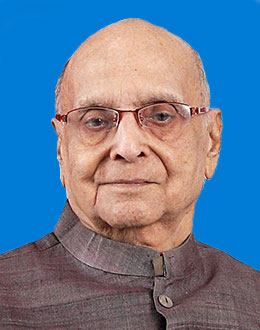
Shri Chandrashekhar S. Dharmadhikari at the tender age of 14 took part in the ‘Quit India Movement. C. S Dharmadhikari was personally responsible for various grass roots activities, which sustained and maintained the Quit India Movement for many years and his contribution has been recognized & acknowledged by the Government of Maharashtra.
As a Judge, his Judgments were outstanding. He belief is that a Judge should be Impartial, but not impassive. Judgments delivered by him, relating to Rights of Women, Adiwasi, Tribals, Children, Labour, Psychologically Disturbed-OR-Clinically Insane People and Prisoners are landmarks, now used as case studies in Indian universities.
As a Chairman of the Dahanu Taluka Environment Protection Authority, he has introduced an altogether new concept and principle in the field of Rehabilitation. The unique and revolutionary concepts of ‘Development without Tears’, “Pre-habilitation” and “Pre-Afforestation” are introduced by him.
He is known as Best Interpreter (BaaYyak ar) of Gandhian Thoughts, throughout the country and is very popular amongst the Youth. His thoughts about the Women Empowerment are well appreciated. He has also associated with the Maharashtra State as well as National Women’s Commission. Today he is known as a backbone of the Sarvodaya Movement.
Prof. Aparna Basu
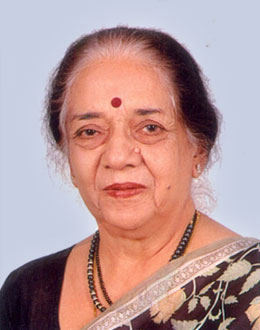
Dr. Aparna Basu is currently Chairperson, National Gandhi Museum, Rajghat, New Delhi. She is also a trustee and patron of All India Women’s Conference and trustee of Sarabhai Foundation, Ahmedabad. She is Chairperson, All India Committee for the Eradication of Illiteracy. Professor Basu is on the Governing Body of Indraprastha College, Delhi University, and of Sardar Patel School.
Dr Basu is a graduate of the University of Cambridge, U.K., from where she did her doctorate also. She has a Master’s degree from George Washington University, Washington DC, USA. She was formerly Professor of Modern Indian History, University of Delhi. She has lectured in many foreign universities and presented papers in conferences and seminars in India and abroad.
Professor Basu has written extensively on the History of Education and on Women’s History. Among her many publications are a book on Kasturba Gandhi and one on Abbas Tyabji, and an Occasional Paper on Women in Gandhian Mass Movements and a lecture on the Relevance of Gandhi Today.
Ram Chandra Rahi
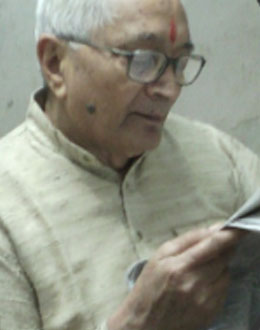
Shri RC Rahi is a child of the struggle, son of the Lt. Panchdeo Tiwari, a freedom fighter and a life-long committed Sarvodaya Worker. He is currently the Chairman of Gandhi Smarak Nidhi (Central), Rajghat, New Delhi since 27th December, 2002 and the Editor of monthly magazine ‘Sansthakul’ in English and Hindi.
Previous positions he has held are Chairman of U P Sarvodaya Mandal for 5 years, Secretary of Sarva Seva Sangh for 3 years, Convener of All India Sarvodaya Samaj for 7 years and Secretary of Gandhi Smarak Nidhi for 15 years.
He has published a number of books and literature regarding the Sarvoday Movement – Gram Sabha : Swaroop aur Sangathan, Gao Jaag Utha (Drama) and Badalte log Badalte Gaon, Maati Ki Maang,Hame Chahiya Apna Raaj to mention a few.
He has also translated a book based on the French Youth Revolution ‘Youth Revolt’ from English to Hindi (Tarun Vidroh) and edited a book based on writings of Acharya Ram Murti, titled ‘Shiksha, Sanskriti Aur Samaj’
He is also the holder of the ‘Acharya Vinoba Bhave Rashtriya Puraskaar’ award by Baba Amte, Anandvan, and Maharashtra, bestowed upon him on the 12th of October, 2003.
Shree Hasmukhbhai Patel
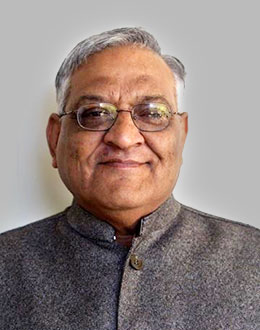
Hasmukh B Patel, (age 64) a full time Gandhian activist had started his career as public worker at the age of 15 in a small village where he was born and brought up.
With science and engineering background, he at the beginning of his career as public activist, decided to work for vital issues like human rights, environment awareness and established of people’s power in board democratic framework of our society.
He major contribution was in translating Trusteeship idea of Mahatma Gandhi into action by creating a model Trusteeship industry being run in Gujarat.
He had also organized massive relief activities in Assam during disturbances in 1993.
He has participated In a three-culture program (Native American, North American and Indian) held In the native American’s Reservation in the U.S. foe three weeks In 1986 and also joined a peace pilgrimage of five Gandhian workers from India In the seven Southern State of U.S.A. where Dr. Martin Luther King Jr. worked. He lead a group of 10 young farmers to Israel to participate in five week programed of studying co-operative agriculture and successfully participated in kibbutz activities.
He was invited by several Universities and Colleges of the U.S.A. for one month to talk to their students and faculty on Gandhi’s Life & Thought. Important among them were St. Lawrence University, Centre for International Studies, Harvard University, Boston College, University of Lowell, University of Pittsburg, Manhattan College, Vassar College. He also visited several institution duting his stay in U.S.A. and participated as a panel member in National conference on peace & justice sponsored by Consortium on Peace, Research, Education and Development.
Shree Shudarshan Iyangar
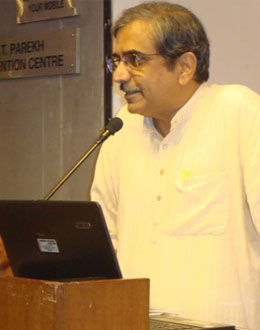
Prof. Sudarshan Iyengar holds a Ph.D. in Economics and is the former Vice-Chancellor (2005-14) of ‘Gujarat Vidyapith’ Ahmedabad founded by Mahatma Gandhi himself. He has authored 65 research articles and published 8 books including ‘Gandhiji and Sanitation’ in 2016.
Former Director for ‘Centre for Social Studies’ Surat (2004-05), and ‘Gujarat Institute of Development Research’ Ahmedabad (1999-2004). He is presently the Chair Professor of ‘Gandhian Philosophy’ at IIT, Mumbai. His major foci of research are:
1) Gandhian Thoughts and Practice,
2) Natural Resource Development and
3) Management, People and Civil Society Institutions.
As a valued Member and chair person on various managing boards of Non-Profit Organizations he was actively involved in the rehabilitation of tribal people displaced by the Narmada Dam Project, during the 1990s. He was also closely involved in relief and rehabilitation of the people affected by the violent earthquake in Kachchh Gujarat in 2001
Currently Vice Chairperson of the ‘Dandi Memorial Committee’ and Member of the ‘National Gandhi Heritage Sites Mission’ initiated by the Ministry of Culture, Government of India.
Dr Rajendra Khimani
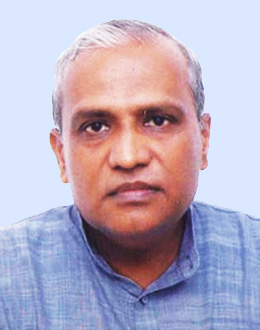
Dr. Rajendra Khimani, holds Ph. D. in Horticulture and is the Registrar ) of ‘Gujarat Vidyapith’ Ahmedabad founded by Mahatma Gandhi himself. He is the Vice President of Horticulture society of Gujarat, India and also the member of also the member of Editorial Board of GAU Research Journal and Member of Board of studies Faculty of Rural Studies of Bhavnagar University.
His present responsibilities are include the administration and operations of the entire University with its 18 graduation programmes as well as the activities related to its status as a Deemed University. Several other institutions like KrishiVigyanKendras, Tribal Research and Training Institute, State Resource Centre, Rural Campuses, Ashram Shalas, Secondary and Higher Secondary Schools come under his aegis. In an attempt to return the University to its original mottos of NaiTalim, BuniyadiShikshan, self-reliance, dignity of productive labour, community living etc. several unique programmeshave been initiated including Pad Yatra, energy conservation and organic farming.
Prof. Anamik Shah
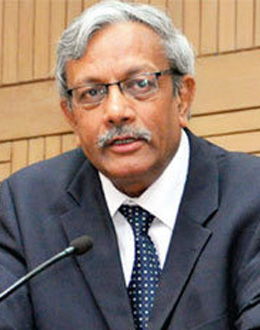
Prof. Anamik Shah is working as a Vice-Chancellor of Gujarat Vidyapith, Ahmedabad;
founded by Mahatma Gandhi in 1920. Currently, looking after it’s various activities of education (Naitalim), higher education, constructive social and extension program at various level across Gujarat. He has got 33 years of teaching experience as a professor of Chemistry and guided and supervised more than 60 Ph D scholars.
He also holds other assignments such as..
- Chairman,Gujarat Vidyapith Trust
- President, Indian Society of Chemists and Biologists (ISCB), Lucknow.
- Principal Investigator, Centre of Excellence, Saurashtra University, Rajkot.
- Trustee, Kaba Gandhi no Delo, Rajkot.
- Trustee, Rashtriya Shala, Rajkot.
- Chairman, ‘Vishwamangalam Trust’, Anera, Dist. Sabarkantha.
- Sardar Vallabhbhai Smarak Trust, Rajkot.
- Editor, ‘Vidyapith’ Research Journal.
- Board of Director of ‘Anuvad Foundation’ (Non-profit organization)
- Chairman, Tribal Research and Training Institute (TRTI), Gujarat Vidyapith.
- Board of Directors, Vikram Sarabhai Science Centre
